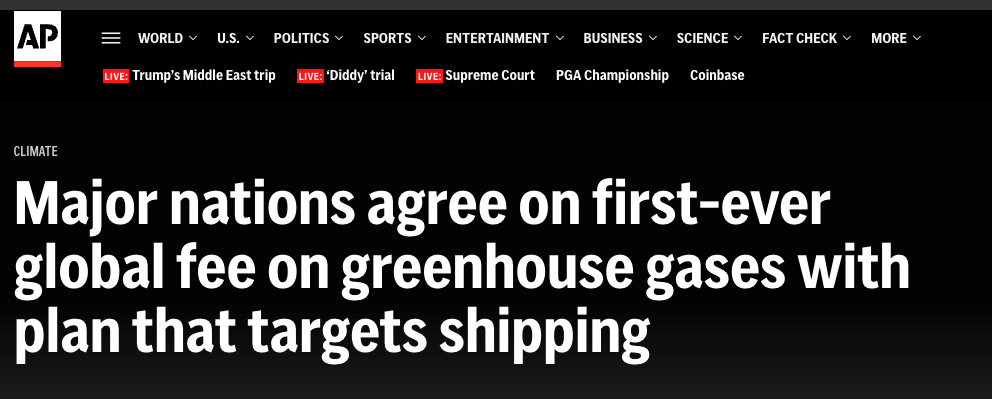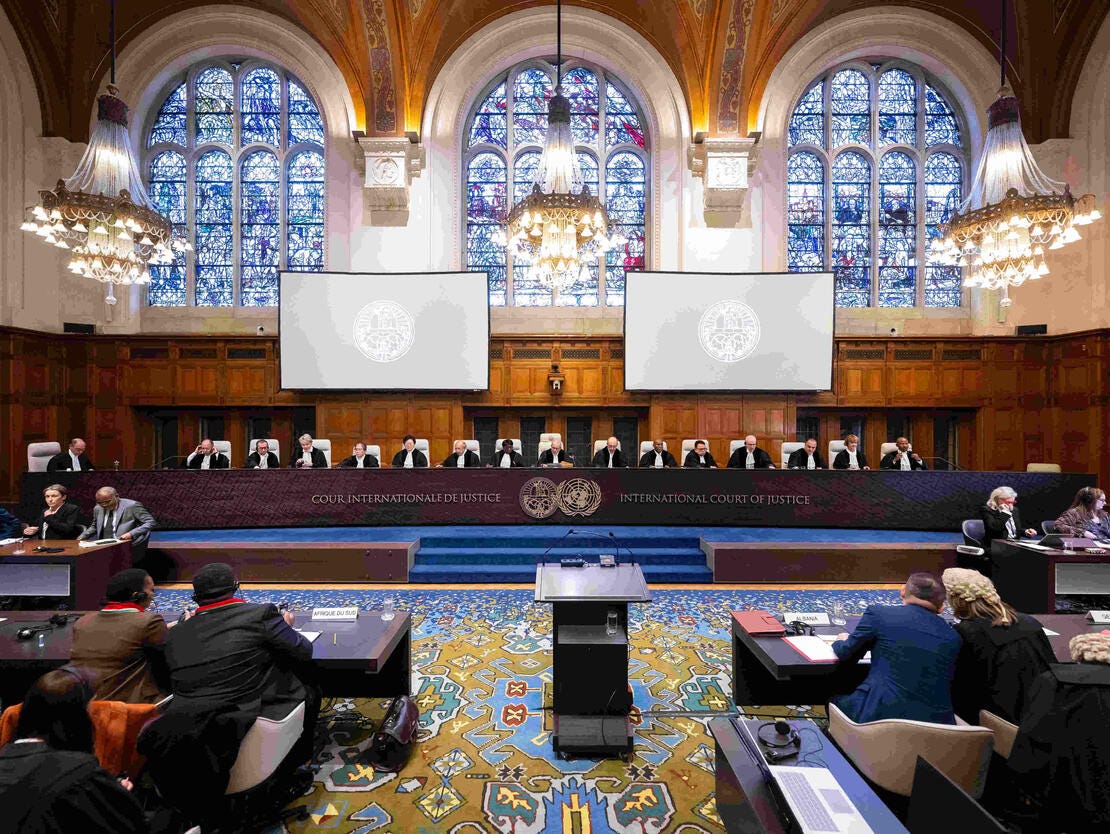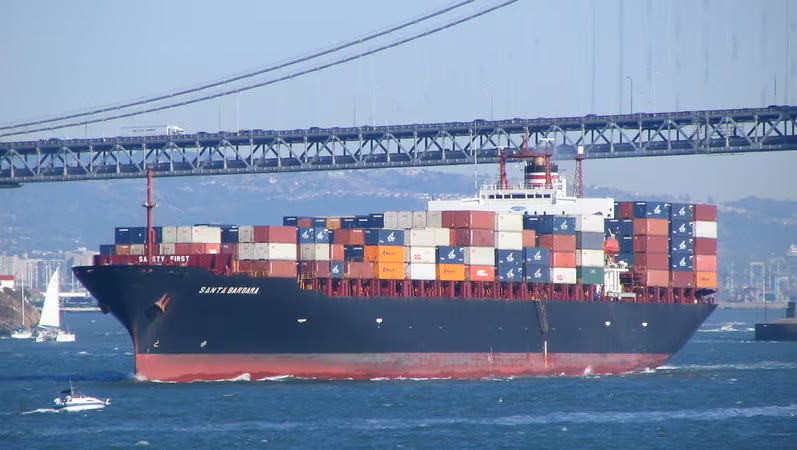Shipping Under Siege: The UN’s Tax Grab and the Coming Trade Chaos
Who really controls the oceans...captains, courts, or carbon counters? A UN tax is turning trade routes into toll roads and climate into courtroom leverage… What happens next?
“Give me control of the shipping lanes, and I care not who makes the climate treaties.” – Probably not Mayer Rothschild, but you get the point.
If you wanted to quietly reshape the global order…redistribute wealth, empower unelected bureaucrats, and jack up the cost of everything from garden hoses to gardenias…you wouldn’t need an army.
You’d need a tax. A sneaky one.
A tax so boring, so shrouded in green virtue, that nobody would see it coming until their Amazon cart screamed for mercy.
That tax is here.

It wears a bowtie labeled “climate justice” and sails under a UN flag. Welcome to the age of cargo cults.
This isn’t just about shipping. It’s about sovereignty.
And it’s about to get expensive.
A Global Tax for the Globalists

Let’s cut to the chase.
In 2028, the UN's International Maritime Organization (IMO) plans to slap a carbon levy on the shipping industry: $100 for every ton of CO₂ emitted that isn’t already captured under another program.
That’s not per ship. That’s per ton of emissions.
The math is simple, the implications staggering.
According to the IMO, this could raise up to $60 billion per year. Who collects this windfall? The UN.
Yes, that UN.
The one famous for peacekeeping missions that rarely keep peace and human rights councils staffed by regimes who wouldn’t know human rights if they were served on a silver platter.
That UN is now a tax collector.
The funds will go into a “net-zero fund,” ostensibly to reward clean shipping and bankroll climate resilience projects in vulnerable states.
In practice, it looks more like a globally sanctioned slush fund.
Think of it as wealth redistribution wrapped in barnacle-studded bureaucracy.
Let’s pause and appreciate the dark artistry here.
For centuries, the world’s navies projected imperial power by controlling trade routes. Now, the UN plans to do the same…through invoices.
$60 billion isn’t a climate policy. It’s a war chest. And if you think this money will be spent transparently and apolitically, you haven’t read the UN’s playbook lately.
But what if this is just the opening volley in something much larger…one that uses courts, not Congress, to enforce obedience?
A Court Case for the Ages
As the tax sails into view, the UN’s judicial wing…the International Court of Justice…is prepping for its own broadside.
In 2025, the ICJ is expected to issue a ruling (technically an “advisory opinion,” though don’t let the mild tone fool you) on whether countries have legal obligations to combat climate change.

The case, launched by a coalition of 132 nations led by Vanuatu, isn’t about emissions. It’s about reparations.
If the court rules in favor, this ruling will carry “moral authority” strong enough to arm a thousand lawsuits.
It’s law-fare on a planetary scale.
Small island states are already pushing for the court to recognize their maritime claims even if their islands sink below sea level.
Translation: even if Atlantis resurfaces, it still gets fishing rights and foreign aid.
It’s a power play masked as a pity plea. And if the ruling goes their way? The greenmail begins.
If the ICJ’s advisory opinion grants legal cover for climate reparations, the floodgates won’t just open…they’ll burst.
The real battle won’t be in courtrooms, though. It’ll play out on the high seas… where the taxman waits with a carbon ledger and a moral halo.
China’s Not on Board
Now, before you start knitting “Save the Planet” potholders, let’s inject a little geopolitics. China…the factory of the world…isn’t thrilled.

They wanted a carbon credit-trading system, not a flat tax that disproportionately hits their ships.
Beijing, alongside Brazil, South Africa, and Saudi Arabia, pushed back. They lost.
But don’t expect compliance. China has alternatives. Belt and Road ports. State-controlled shipping giants. Friendly routes through Russia.
Don’t be surprised if they turn this into a two-tier trade system: taxed lanes for Westerners, untaxed for everyone else.
That’s not paranoia. That’s strategy.
And it’s already happening.
China’s COSCO is expanding its global footprint. They’re not just shipping goods…they’re building the docks, financing the cranes, and writing the rules.
Meanwhile, the US under Trump 2.0 is giving the whole scheme the diplomatic finger.
They didn’t even show up to the IMO negotiations. They’re not just against the tax…they’re actively working to kill it.
Expect executive orders. Lawsuits. Maybe even a unilateral exemption wrapped in red, white, and blue ribbon.
When the two biggest economies on the planet say “no thanks,” what happens to the plan?
Answer: nothing clean.
When Beijing and Washington agree on something…anything…it’s usually worth paying attention.
And this time, they’re united in their opposition to the UN’s maritime money grab.
But their resistance isn’t just political. It’s logistical. What happens when two empires start building separate oceans?
Trickling Down to Your Doorstep
Let’s talk impact. Shipping moves 80% of global trade by volume. Slap a global tax on it, and prices go up…on everything.
The IMO says the levy might add 1–2% to shipping costs. That’s cute.
More realistic estimates say costs could double for some routes, especially for the kinds of goods people in developed countries like to buy cheap and in bulk.
Think AliExpress knickknacks. Organic shampoo. Tuscan olive oil. Anything light, fast, and global.
Now imagine a world where all of that costs 20–30% more…on purpose.
Environmentalists aren’t happy either. Groups like Opportunity Green say the tax doesn’t go far enough.
So to recap: the UN thinks it’s the right amount, green activists think it’s too low, and shippers think it’s a knife in the back. A consensus of dissatisfaction. That’s the rarest form of international harmony.
The average consumer won’t see it on the receipt, but they’ll feel it in their wallet. And when “climate justice” starts looking like food inflation and supply shocks, the backlash will begin.
The question is: will it come fast enough to stop the legal machinery being built beneath our feet?
The ICJ and the Future of Lawfare
Back to the court case.
While it’s not binding, the ICJ’s ruling could turbocharge climate litigation.
Already, Canada’s bracing for lawsuits.
The Ontario Superior Court recently ruled that the government had a duty to protect its citizens from climate change…opening the door for lawsuits based on emissions failures.
If the ICJ adds its “moral authority,” the floodgates open.
Expect NGOs to cite the ruling in every lawsuit from Manila to Manchester.
What’s being created here isn’t just a tax. It’s an architecture…a framework for global governance that doesn’t need consent or elections. Just enough smoke from the “climate emergency” to sneak in through the cracks of international law.
We’ve seen this playbook before: manufacture a crisis, impose a solution, and hand the keys to unaccountable technocrats.
The twist this time? The whole planet is the jurisdiction.
With every ruling, a new legal weapon is forged.
This isn’t just about courtrooms…it’s about creating a system of moral taxation without democratic representation. And that system needs infrastructure.
Lucky for the globalists, the UN has been quietly laying the foundation for years.
Shipping as the New Battlefield
Make no mistake…this isn’t about decarbonization. It’s about centralization.
The UN’s move turns the global shipping lanes into toll roads, with them manning the booth. If you control the cost of movement, you control the cost of everything.
It’s economic chokehold by spreadsheet.
And don’t forget the timing: 2025 ruling. 2027 implementation. 2028 enforcement.
That’s not a roadmap. That’s a timeline.
You’re being softened up right now…told the world is on fire, told this is the only way.
Meanwhile, the carbon ladder we climb to fuel modern life…wood to coal to oil to gas…is being greased from above.
Energy is life. And shipping is how life moves.
So what happens when shipping becomes a political act?
Once shipping becomes politicized, everything that moves becomes leverage. And everything that can’t move? A liability.
If you thought central banks were powerful, wait until you meet the central planners of the sea. But their real power lies not in what they tax… but in what they fund.
What to Watch Next
If the ICJ rules that rich countries owe reparations for climate change, expect litigation to explode. Think class-action lawsuits…just global.
Countries that oppose the tax…like the US and China…will seek workarounds. Expect parallel trade networks. Expect friction.
As costs rise, look for populist backlashes in Europe and North America. No politician survives when bacon triples in price.
And above all, watch who controls the fund. The $60 billion slush pile. Because whoever steers that money isn’t saving the planet. They’re running it.
This isn’t environmentalism. It’s empire with a new paint job.
And like all empires, it ends with the peasants paying the bill.
So before you check out your next overseas order, ask yourself: what’s the real price of that package?
It might be more than just shipping.
Class-action lawsuits won’t just hit companies. They’ll hit entire economies. As the legal and financial crossfire escalates, the question isn’t who pays… it’s who gets paid.
And if you follow the money, you’ll find the architects of the next global regime already cashing in
Stay tuned. The sails are rising. The tollbooths are being built. And the weather? Oh yes, it’s still changing.
👉 Get caught up on our latest premium report, Insider #311!





Good one Chris but won't markets take command in the end? There's always a work-around whatever the BeauroCrats demand. I spent my life working around UK crap so I am sure there are bright guys ready to cash their checks when the isht hits the fan. https://dailysceptic.org/2024/12/12/if-you-thought-the-farmers-inheritance-tax-raid-was-bad-wait-till-you-see-what-its-proponents-have-in-store-for-us-next/